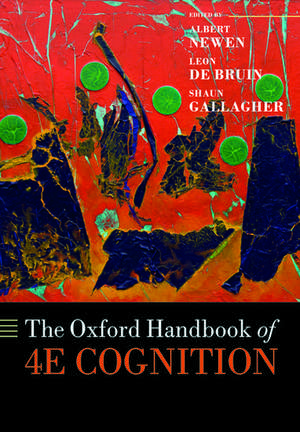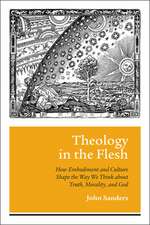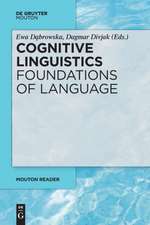The Oxford Handbook of 4E Cognition
Editat de Albert Newen, Leon De Bruin, Shaun Gallagheren Limba Engleză Paperback – mai 2020
| Toate formatele și edițiile | Preț | Express |
|---|---|---|
| Paperback (1) | 365.53 lei 10-16 zile | +109.03 lei 6-10 zile |
| OUP OXFORD – mai 2020 | 365.53 lei 10-16 zile | +109.03 lei 6-10 zile |
| Hardback (1) | 829.25 lei 10-16 zile | |
| OUP OXFORD – 13 sep 2018 | 829.25 lei 10-16 zile |
Preț: 365.53 lei
Preț vechi: 482.44 lei
-24% Nou
Puncte Express: 548
Preț estimativ în valută:
69.95€ • 72.16$ • 58.37£
69.95€ • 72.16$ • 58.37£
Carte disponibilă
Livrare economică 22-28 februarie
Livrare express 18-22 februarie pentru 119.02 lei
Preluare comenzi: 021 569.72.76
Specificații
ISBN-13: 9780198863472
ISBN-10: 0198863470
Pagini: 960
Dimensiuni: 170 x 246 x 45 mm
Greutate: 1.84 kg
Editura: OUP OXFORD
Colecția OUP Oxford
Locul publicării:Oxford, United Kingdom
ISBN-10: 0198863470
Pagini: 960
Dimensiuni: 170 x 246 x 45 mm
Greutate: 1.84 kg
Editura: OUP OXFORD
Colecția OUP Oxford
Locul publicării:Oxford, United Kingdom
Recenzii
What I like most about this book is that it is not just a collection of what 4E Cognition is, it is also a rigorous critique of what it is not: The final chapter in sections one to nine is a critical review of the preceding discussions, providing a balanced view of the topic area. I would recommend this book to anyone with an interest in cognition, not only to those interested in whether it is embodied, embedded, extended or enacted. The notion of 4E cognition does have its challenges, and this book does not shy away from this. I feel even those with a more critical view of 4E Cognition would enjoy The Oxford handbook of 4E Cognition, and certainly enjoy the critical chapters in each section. Overall, it presents the characterisation of cognition in a clear manner throughout, and while it is a comprehensive read at over 900 pages long, it is a very interesting read none-the-less.
The ten sections and forty-eight contributions of this handsomely produced handbook explore both these foundational questions about the nature of cognition and embodiment and the applications of 4E perspectives to social cognition, language and culture and specific applications in, for example, psychopathology and aesthetics. Especially commendable is the inclusion of critical notes which offer criticisms of the contributions in each chapter from exponents of the mainstream tradition. This enables a real sense of dialogue both between post-representationalists and the mainstream and from within the variously ambitious forms of 4E-Cognition.
"[The Oxford Handbook of 4E Cognition] is a substantial tome, coming in at nearly 1,000 pages and forty-eight contributions. The most useful innovation in this volume is the inclusion of critical reflections at the end of each section. These will prove especially valuable for the reader who is less familiar with the field.
The ten sections and forty-eight contributions of this handsomely produced handbook explore both these foundational questions about the nature of cognition and embodiment and the applications of 4E perspectives to social cognition, language and culture and specific applications in, for example, psychopathology and aesthetics. Especially commendable is the inclusion of critical notes which offer criticisms of the contributions in each chapter from exponents of the mainstream tradition. This enables a real sense of dialogue both between post-representationalists and the mainstream and from within the variously ambitious forms of 4E-Cognition.
"[The Oxford Handbook of 4E Cognition] is a substantial tome, coming in at nearly 1,000 pages and forty-eight contributions. The most useful innovation in this volume is the inclusion of critical reflections at the end of each section. These will prove especially valuable for the reader who is less familiar with the field.
Notă biografică
Albert Newen received his PhD in 1994 from the University of Bielefeld. He became associate professor in 2003 at Tübingen, changed to the Ruhr-University Bochum (RUB) in 2007 and was appointed to full professor in 2010. He is director of the interdisciplinary Center for Mind, Brain and Cognitive Evolution since 2011. He received several research awards, including the Bennigsen-Foerder Award (North-Rhine Westfalia) as well as the award for "Philosophy in Psychiatry" from the society of psychiatry in Germany (DGPPN). He was visiting professor in Oxford, Stanford and Urbana-Champagne. His research combines philosophical theory formation with research in psychology, psychiatry and neurosciencesLeon de Bruin (1979) obtained his PhD in philosophy from the University of Leiden in 2010 with an interdisciplinary study on social cognition. After his PhD, he worked as a postdoc at the Ruhr-University Bochum on the development of false belief understanding. He was appointed assistant professor of philosophy of mind at the Radboud University Nijmegen in 2012, and associate professor of philosophy of mind in 2017.Shaun Gallagher is the Lillian and Morrie Moss Professor of Excellence in Philosophy at the University of Memphis. His areas of research include phenomenology and the cognitive sciences, especially topics related to embodiment, self, agency and intersubjectivity, hermeneutics, and the philosophy of time. Dr. Gallagher has a secondary research appointment at the University of Wollongong, Australia. He is Honorary Professor at the University of Tromsø, Norway. He has held visiting positions at the Cognition and Brain Sciences Unit, Cambridge University; the Center for Subjectivity Research, University of Copenhagen; the Centre de Recherche en Epistémelogie Appliquée (CREA), Paris; the Ecole Normale Supériure, Lyon; the Humboldt University in Berlin, and most recently at Keble College, University of Oxford.



